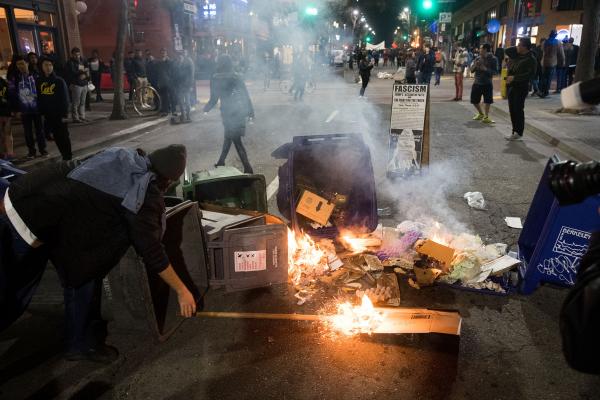Institutional Racism
Did you know that The University Of California, Berkeley and Berkeley College (Yale University) are named after a devout Christian and slave owner?All across the country, centuries-old names that adorn statues, buildings and streets are under siege. Once widely honored in a different era, men whose names are etched on statues and college campuses have become symbols of hate. Mind numbed people inspired in part by, The Alt-Left Media, corrupt politicians and the Black Lives Matter movement, are calling for the removal of these symbols honoring people connected to slavery, colonialism and the Confederacy. Maybe these same people, who are so open-minded their brains are falling out, should demand that these two institutions along with Berkeley California be renamed. Berkeley College (Yale University)Berkeley College is a residential college at Yale University, opened in 1934. The eighth of Yale’s 12 residential colleges, it was named in honor of George Berkeley (1685–1753), dean of Derry and later bishop of Cloyne, in recognition of the assistance in land and books that he gave to Yale in the 18th century. University of California, BerkeleyThe University of California, Berkeley, (also referred to as UC Berkeley, Berkeley, Cal, Cal Berkeley, and California) is a public research university located in Berkeley, California. Founded in 1868, Berkeley is the oldest of the ten research universities affiliated with the University of California system and is ranked as one of the world’s leading research universities and the top public university in the United States. In 1869 Frederick H. Billings was a trustee of the College of California and suggested that the college be named in honor of the Anglo-Irish philosopher George Berkeley. From Yale, Slavery & Abolition:Bishop George Berkeley bought 3-5 slaves during his brief stay in the New World between 1728 and 1731, to work on his Rhode Island plantation, Whitehall. When Berkeley returned to Europe in 1731, he donated the plantation to Yale. Yale turned payments from the plantation into its first set of scholarships. At this time, the plantation likely continued being worked by slaves. Charles Handy leased Whitehall farm from Yale, and sent Yale payments that would fund scholarships. The Rhode Island census, in 1774, shows that the household of Charles Handy included: “Blacks: 4”. It is likely that these four black people included in Handy’s household were slaves. In his study of slavery in the 1774 Rhode Island census, Louis Masur explains:
The density of slave owning white households in Newport county in 1774 was almost as high as the density of slave owning white households in the American South during the Civil War. It would be normal for someone farming a Newport plantation to use slaves to work the land. Words etched into the floor of Berkeley College today explain:
George Berkeley had slaves working his plantation until he left in 1731. The profits earned by leasing the Whitehall plantation after 1732 funded Yale’s first scholarships. The person leasing the plantation around the time of the 1774 census included four black people as members of his household, and most black people so listed were slaves. Assuming slaves worked the old Berkeley plantation, then Yale’s own land was worked by slaves, and Yale’s first scholarship was funded for up to 50 years with money earned from slave labor. It is for the gift of this plantation that his name is honored today with the name of “Berkeley college“. Berkeley’s SlavesAfter coming to the colonies, Berkeley bought a plantation in Newport, Rhode Island-the famous “Whitehall.” On October 4, 1730, Berkeley purchased “a Negro man named Philip aged Fourteen years or thereabout.” A few days later he purchased “a negro man named Edward aged twenty years or thereabouts.” On June 11, 1731, “Dean Berkeley baptized three of his negroes, ‘Philip, Anthony, and Agnes Berkeley'”. Berekley’s sermons explained to the colonists why Christianity supported slavery, and hence slaves should become baptized Christians:
“The past was erased, the erasure was forgotten, the lie became the truth.” ~ George Orwell, 1984 |
The University Of Life
John Kallam graduated with a BA in criminology and entered the US Army. He served for 20 years beginning in the late 1930s. He was an investigator during the Nuremberg trials of Nazi war criminals, and stayed in Germany for many years, organizing civilian police forces in the post-war era. He also wrote numerous books on criminal justice. He retired from military service in the late 1950s at the rank of full colonel.
Returning to Fresno, California, he began teaching criminology at what was then Fresno State College (later to become the California State University, Fresno). His work was well respected, but after about ten years of service, he was called to see the president of the college. He was informed that he could no longer teach with just a bachelor’s degree. Times were changing, he was told, and the school demanded that faculty members hold a graduate degree. Merely having 20 years of distinguished experience was no longer considered sufficient qualification to teach. All new faculty were being required to hold a doctorate, it was explained, and the school was actually doing him a favor by letting him keep his job by getting ‘only’ a master’s degree. So John enrolled in a summer program at an out-of-state college. Three months of intensive seminars and then nine months of home study would get him his MA.
On the first day of class, the instructor was taking roll. He stopped when he read John’s name.
“Are you related to the John Kallam who wrote the textbook we’ll be using?” he asked.
“I am the John Kallam who wrote the textbook you’re using,” came the dry response.




